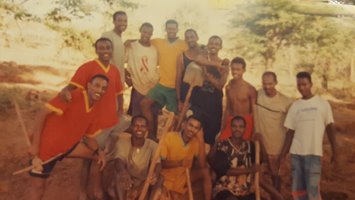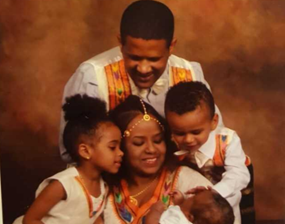From Refugee to Registered Nurse
 In 15 years, Gebrezghi made the transition from 23-year-old draftee to refugee, and from refugee to registered nurse. Gebrezghi lives in Seattle, where he has worked as a nursing assistant for 11 years, and where he will now continue to work as a registered nurse. His story is one of victory over extreme odds, but still he says, “I’m not unique. I’m not an exception, I’m not alone.”
In 15 years, Gebrezghi made the transition from 23-year-old draftee to refugee, and from refugee to registered nurse. Gebrezghi lives in Seattle, where he has worked as a nursing assistant for 11 years, and where he will now continue to work as a registered nurse. His story is one of victory over extreme odds, but still he says, “I’m not unique. I’m not an exception, I’m not alone.”When Gebrezghi was young, he was increasingly frustrated by the lack of opportunities in his native country, Eritrea. “There is no justice, and no education or future,” said Gebrezghi. “My country forces people to go in the military for life. I didn’t want to go into the military. I could serve for two or three years, but I didn’t want to serve my country forever for nothing. I chose to leave so I could live my life and so I could continue my education.”
Gebrezghi’s sentiments were echoed by hundreds of thousands of people who would become refugees in the next ten years. “There are currently more than 216,000 Eritrean refugees in Ethiopia and Sudan,” states a 2014 brief from UNHCR spokesperson Adrian Edwards. “Eritreans started to arrive in Ethiopia in 2002, after the end of the conflict between the two countries. The recent arrivals told us that they were fleeing an intensified recruitment drive into the mandatory and often open-ended national service.” Gebrezghi’s brothers, who are still in Eritrea, are on their 16th and 17th years of military service without pay.
Gebrezghi knew he had to leave Eritrea, but doing so was quite dangerous. He had to leave on foot through the heavily guarded border. “If they see you, they will shoot you,” he said. “Either you are going to die or you are going to pass.” Gebrezghi escaped during the night with two friends, and walked for three days through the desert into Ethiopia. He found a refugee camp in Ethiopia and, with no money and no place to go, stayed there for three years.
Conditions in the camp were miserable, and the people more so. “People in refugee camps, they are hopeless, most of them. They don’t know where to go. They are just sitting for 24 hours,” said Gebrezghi. Looking back, he recognizes that the health of the people in the camp was suffering. “People get sick because there is not enough treatment. You see young people dying. I was there, I know the pain.”
After three years as a refugee, Gebrezghi was sponsored by Catholic Services, who brought him to the US, where he was granted citizenship. Two months into a new job, and Gebrezghi was independent. The transition was not easy. Gebrezghi was one of the first Eritrean refugees. Few in America had even heard of his native language: Tigrinya. “I was the first generation to be here. I had to do everything by myself,” said Gebrezghi. The two friends who fled Eritrea with Gebrezghi were also sponsored to come to America in 2005.
 Although his dream was to get an education and be a full-time student, first he had some things to take care of. “I started to work two jobs, to work and to help my family. I knew that education was very important, but first I had to help my family and my friends who were still refugees, I needed to help them.”
Although his dream was to get an education and be a full-time student, first he had some things to take care of. “I started to work two jobs, to work and to help my family. I knew that education was very important, but first I had to help my family and my friends who were still refugees, I needed to help them.”Gebrezghi started his Associate Degree, one class at a time, while working to help his siblings, friends and parents monetarily. At this point he married and started a new family here in the states.
Now, several years later, he has graduated from Nightingale College’s Associate of Science in Nursing Program. Despite the almost-10-year delay in his education, Gebrezghi has no regrets. “Honestly, even though I didn’t continue my education until now,” he said, “I was happy to help people, because that’s a part of me, that always makes me happy. That’s why I went into nursing.”
Another reason Gebrezghi chose nursing was his employment as a CNA at Swedish Medical Center in Seattle. Lauren Smith, an RN at the facility, wrote in a school application recommendation that “Dawit is known to take it upon himself to volunteer to work extra hours to make sure the patients remain safe and cared for...I believe Dawit has the intellectual and interpersonal skills to excel not only in nursing school but also ultimately in his profession as a registered nurse.”
With encouragement like this from staff at the facility, Gebrezghi applied for the ADN Program at Nightingale College. “Nightingale, for me, it changed my life,” he said. He always knew he would come back to school, but was nervous about starting again. At Nightingale, however, he soon found that the faculty and staff were ready to help. “I’m happy with the education I got at Nightingale. The teachers are very helpful and kind. They help you to be a better nurse.”
Once he is licensed, he plans to continue working for Swedish, now as an RN.
Gebrezghi got into healthcare just to find a job, but now, it has become a passion. ”When people come sick, and get better, and they become independent, that’s my favorite thing,” said Gebrezghi. He loves seeing people recover and regain hope. “When you’re sick, you don’t realize how much you need. You’re hopeless, and you don’t realize that everything is going to change.” Gebrezghi feels he relates to his patients because he too has been hopeless, suffering, and dependent on others.
Now that he has become an RN, his goal for the future is to organize and train nurses to go on humanitarian trips to refugee camps. He wants to repay the kindness that he received.
“If I get the chance, I want to organize people like me, who were refugees, so we could serve people who are in refugee camps. I have to help people over there because they don’t have enough nurses. That’s my dream. You have to change the world by showing your respect. I want to live beyond myself. There are a lot of refugees in Ethiopia, a lot of young people, and they need support. I’m happy I got enough education to help refugees so I can go back.”
Although he wants to organize something extraordinary, Gebrezghi doesn’t see himself as extraordinary. He is just thankful he survived being a refugee, as many of his countrymen died trying to escape across the Mediterranean Sea. And even though he survived and overcame incredible obstacles, he doesn’t think of himself as being different than any of his classmates.
“I’m not unique, because every person has a life struggle,” he said. “Even if you’re born here, everyone has a struggle, but that’s not the important thing. The important thing is how we change and how we live for the future. I don’t want to look to the past, I want to help people. That’s my only message.”
NRHA commissioned the above piece from Nightingale College, a trusted NRHA partner, for publication within the Association’s Rural Health Voices blog.
